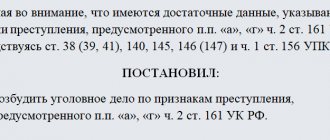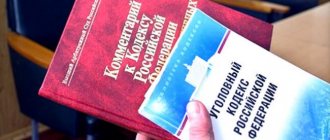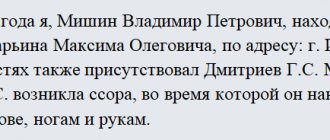Everything about criminal cases
I). IT IS MANDATORY TO ACCEPTLet's list the situations when accepting a case is mandatory. That is, when required, draw up a procedural document - a resolution on accepting the case for its proceedings.
When transferred from one investigator to another
Url Additional information:
- part 1 156 of the Code of Criminal Procedure
acceptance for proceedings in the decision to initiate proceedings
- Part 2 156 Code of Criminal Procedure
in an already initiated case, a separate resolution on the adoption
- if the case is initiated by the investigator, then he does not issue a separate decision on accepting the case ( Part 1 156 of the Code of Criminal Procedure
).
Url Additional information:
- Part 2 156 Code of Criminal Procedure
in an already initiated case, a separate resolution on the adoption
- but the second investigator (and all subsequent ones), if the case goes to him, is obliged to make a decision ( Part 2 156 of the Code of Criminal Procedure
).
— in this case, the first investigator loses all powers in the case and if the case goes round and ends up in his hands again, then the decision on acceptance must be made anew. Otherwise it will be a violation.
Url Additional information:
— clause 24
Plenum No. 41, the court checks whether the case has been accepted for proceedings
For example: if an investigator submits a petition to the court for detention, the judge checks whether the case is being processed by this investigator ( clause 24
Plenum No. 41).
Url Additional information:
Errors during registration
Finding the error
when transferring a criminal case to another investigator
You can read how to find such a violation here: Finding an error
when transferring a criminal case to another investigator, where it can be “unearthed.”
When the case is returned from the prosecutor
- from the moment the case is sent to the prosecutor ( Part 6 220 of the Code of Criminal Procedure
) the investigator loses authority in the case, it has dropped out of his proceedings and he can no longer carry out any procedural actions.
- upon return of the case from the prosecutor ( clause 2, part 1, 221 of the Code of Criminal Procedure
) the investigator is obliged to re-accept the case for proceedings. This is not stated directly anywhere, this obligation exists and judicial practice fully confirms this, here is a typical example:
ILLUSTRATION
Cassation ruling of the Lipetsk Regional Court dated April 24, 2012 in case No. 22-704/2012.
«After drawing up the indictment and sending the criminal case to the prosecutor, the investigator completed the preliminary investigation, i.e. exhausted
their powers.
By virtue of Part 2 156 of the Code of Criminal Procedure, if the investigator is entrusted with the proceedings of an already initiated criminal case, he issues a decision to accept it for his proceedings. Since after the return of the criminal prosecutor to re-draft the indictment, the case was not accepted by investigator L. - the re-drafting of the indictment was carried out by an unauthorized person
on that face
."
Elimination of incompleteness of the investigation
A separate nuance: when returning a case, you can use special tactics related to challenging investigative actions taken after the case was received by the investigator. You can read about it here: Eliminating Incompleteness
consequences when returning to the prosecutor - finding the error, how to use it.
If the prosecutor transfers cases between investigative authorities
The prosecutor has three unique rights, he can:
Url Additional information:
- clause 12 part 2 37 Code of Criminal Procedure
the prosecutor transfers cases between investigative bodies
A)
transfer cases between different investigative bodies, that is, interfere in issues of jurisdiction (
clause 12, part 2, 37 of the Code of Criminal Procedure
).
True, this does not give him the right to appoint specific executors ( clause 12, part 2, 37 of the Code of Criminal Procedure
).
Url Additional information:
- clause 12 part 2 37 Code of Criminal Procedure
the prosecutor withdraws the case and transfers it to the Investigative Committee
b)
withdraw the case from any investigative body (Ministry of Internal Affairs, FSB) and transfer it to the Investigative Committee (
clause 12, part 2, 37 of the Code of Criminal Procedure
).
Url Additional information:
— Part 4 150 Code of Criminal Procedure
investigation instead of inquiry (on behalf of the prosecutor)
V)
transfer cases from investigation to inquiry within the investigative body (
Part 4 150 of the Code of Criminal Procedure
).
When connecting criminal cases
Url Additional information:
—
153 Criminal Procedure Code
connection of criminal cases
If several criminal cases are combined into one ( 153 Criminal Procedure Code
), then the new case receives a new number and the investigator is obliged to accept this new case formed from the merger in writing for proceedings.
Exception
: if all the attached cases were already in the process of this investigator, then if the investigator forgets to accept this new case, then this is not considered an error.
(Example: Appeal ruling of the Judicial Collegium for Criminal Cases of the Supreme Court of the Russian Federation dated October 31, 2016 N 56-APU16-17 “ the head of the investigative body combined the criminal cases and entrusted the investigation to investigator K. Since both cases were in the proceedings of this investigator even before their connection, and The joined case remained in his proceedings; in this case, there
was no .
If the case was suspended
Url Additional information:
—
208 Criminal Procedure Code
suspension of investigation
—
211 Code of Criminal Procedure
, resumption of investigation in a suspended case
If the investigation of a criminal case was suspended on one of the grounds provided for in 208 of the Code of Criminal Procedure
, then after the investigation has been resumed (
211 Code of Criminal Procedure
), it must also be accepted for proceedings.
If the boss takes the case
Url Additional information:
- Part 2 39 Code of Criminal Procedure
the head of the investigation department has the right to investigate the matter
- the head of the Investigation Department has the right to take the investigation into his own hands ( Part 2 39 of the Code of Criminal Procedure
).
Url Additional information:
— Part 2 40.1 Code of Criminal Procedure
the head of the investigation unit has the right to investigate the case
- the head of the inquiry unit has a similar right ( Part 2 40.1 of the Code of Criminal Procedure
).
In such cases, they are obliged to issue a separate decision on accepting the case for proceedings.
Inventory of a criminal case on the fact of a robbery (Part 2 of Article 162 of the Criminal Code of the Russian Federation) 1. Resolution on initiating a criminal case and accepting it for proceedings 2. Protocol on the acceptance of an oral statement about the crime 3. Resolution on recognition as a victim (Pupkin) 4. Interrogation protocol victim (Pupkina) 5. Resolution on conducting a personal search in urgent cases 6. Notification on conducting a personal search 7. Protocol on the detention of the suspect 8. Protocol on the interrogation of the suspect 9. Protocol on the interrogation of the suspect 10. Resolution on the examination of the suspect 11. Protocol on the examination 12. Protocol of inspection of objects 13. Resolution on filing a petition before the court to seize the property of the suspect 14. Protocol on presenting a person for identification 15. Protocol of confrontation 16. Resolution on obtaining samples for comparative research 17. Resolution on ordering a biological forensic examination 18. Order to carry out operational-search activities 19. Resolution to initiate a petition before the court to carry out a seizure in a home 20. Resolution to authorize a seizure of a home 21. Seizure protocol 22. Protocol for checking testimony on the spot 23. Resolution to select a preventive measure in the form of a subscription on recognizance and proper behavior 24. Resolution on bringing in as an accused 25. Protocol of interrogation of the accused 26. Resolution on filing a petition before the court to choose a preventive measure in the form of detention 27. Resolution on choosing a preventive measure in the form of detention 28. Protocol familiarization of the accused with the expert's opinion 29. Resolution to separate the criminal case 30. Resolution to search for the accused 31. Instruction to carry out operational search activities 32. Resolution to suspend the preliminary investigation in connection with paragraph 1 of Art. 208 of the Code of Criminal Procedure of the Russian Federation 33. Protocol of notification of the completion of investigative actions 34. Resolution to refuse to satisfy the petition 35. Protocol of familiarization of the victim with the materials of the criminal case 36. Protocol of familiarization of the accused and his defense attorney with the materials of the criminal case 37. Indictment on charges of committing a crime, provided for in Part 2 of Article 162 of the Criminal Code of the Russian Federation
- Model of a criminal case on the fact of robbery.






